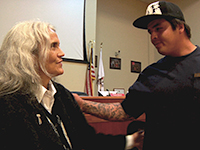
SDH Captioned
Grades 7 - 12, College, Adults
Directed by Anne Makepeace
DVD Purchase $306, Rent $83
US Release Date: 2017
Copyright Date: 2017
DVD ISBN: 1-941545-88-2
Subjects
Addiction
American Studies
Anthropology
At-risk Youth
Community
Criminal Justice
Folklore
History
Human Rights
Law
Mass Incarceration
Mental Health
Native Americans
Recovery
Restorative Justice
Social Justice
Social Psychology
Social Work
Sociology
Western US
Women's Studies
Awards and Festivals
National Broadcast on PBS's "POV"
Directing Award, Cinetopia Film Festival
Santa Barbara International Film Festival
Full Frame Documentary Film Festival
Port Townsend Film Festival
Documents an effective criminal justice reform movement in America: the efforts of tribal courts to return to traditional, community-healing concepts of justice..
Original Price for Educational Rights: $350 - Special Discounted Price: $306
 |
"Highlights the potentially redemptive force of restorative justice in tribal communities. It's not to be missed." Angela R. Riley, Dir, Native Nations Law and Policy Center, UCLA |
TRIBAL JUSTICE is a feature documentary about a little known, underreported but effective criminal justice reform movement in America today: the efforts of tribal courts to create alternative justice systems based on their traditions. In California, the state with the largest number of Indian people and tribes, two formidable Native American women are among those leading the way. Abby Abinanti, Chief Judge of the Yurok Tribe on the northwest coast, and Claudette White, Chief Judge of the Quechan Tribe in the southeastern desert, are creating innovative systems that focus on restoring rather than punishing offenders in order to keep tribal members out of prison, prevent children from being taken from their communities, and stop the school-to-prison pipeline that plagues their young people.
Abby Abinanti is a fierce, lean, elder. Claudette White is younger, and her courtroom style is more conventional in form; but like Abby, her goal is to provide culturally relevant justice to the people who come before her. Observational footage of these judges' lives and work provides the backbone of the documentary, while the heart of the film follows offenders as their stories unfold over time, in and out of court. These other stories unfold over time, engaging viewers with the dedication of the judges, the humanity of the people who come before them, and a vision of justice that can actually work.
Through the film, audiences will gain a new understanding of tribal courts and their role in the survival of Indian people. The film will also inspire those working in the mainstream legal field to consider new ways of implementing problem-solving and restorative justice, lowering our staggering incarceration rates and enabling offenders to make reparations and rebuild their lives.
Reviews
"Raw and honest, Tribal Justice takes an unflinching look at criminal justice in Indian country...Alongside a fearless portrayal of reservation life and those caught up in the criminal justice system, this film highlights the potentially redemptive force of restorative justice in tribal communities. It's not to be missed."
"A lovely, bittersweet film about an intensely delicate subject."
"Tribal Justice is an emotional and moving story about some of the issues facing American Indian communities and tribal attempts to use court systems for restorative justice and healing instead of just to punish. This movie shows the innovative and culturally appropriate efforts of tribal governments in California, and two native female judges in particular, who are working to improve the lives of the parties in court and their communities at large."
"Tribal Justice is about bringing traditional balance back to the lives of Native Americans when in crisis. The film is a powerful testament on the strength of Tribal Courts to hold together communities, sovereignty, and law."
"Tribal Justice provides a compelling and humane face for tribal sovereignty...We meet fellow tribal members whose struggles with poverty, alienation, substance abuse and violence inevitably bring them to the attention of their tribal courts and, in the process, to traditional Indigenous justice systems that emphasize restoration and healing, instead of retribution and ostracism. The outcomes are not always successful, but in this clear-eyed and honest film, we gain a sense of the humanity residing within the tribal justice system and with it, the optimism for tribal communities to succeed on their own terms."
"A beautifully shot and incredibly moving portrayal of the strengths and challenges of tribal communities today. I learned a lot from it, even though I have lived and worked on reservations, and written about tribes and Indian law throughout my career...High school, college, and graduate level classes on many subjects--indigenous peoples, criminal justice, family law, women's leadership, and substance abuse, just to name a few--would be enriched by showing this film."
"A very poignant and heart-wrenching documentary depicting the painful struggles of Indigenous people in the United States to break from the colonizing cycle of drug addiction and family fragmentation...The instructive roles played by Yoruk Chief Judge Abby Abinanti and Quechan Chief Judge Claudette White can be of significant benefit to U.S. criminal justice."
"Extraordinary...As beautiful to watch as it is haunting...By focusing on Abby Abinanti and Claudette White, two strong women determined to do good work for the people they love, Makepeace has made a film that is as gratifying as it powerful."